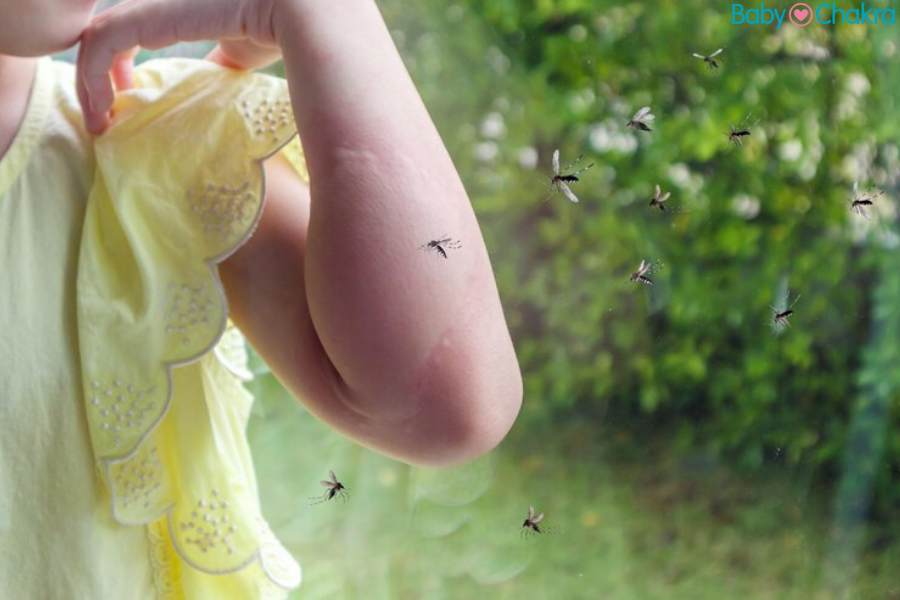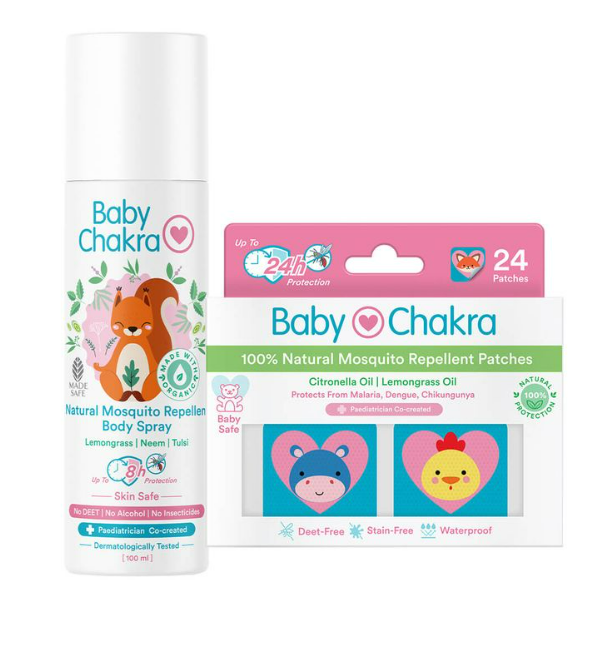
Mums, Stay Away From DEET-Based Mosquito Repellents! Here’s Why
15 Feb 2023 | 5 min Read
Manisha Pradhan
Author | 1053 Articles
Mosquitoes are notorious for carrying and transmitting diseases, such as dengue, malaria, and Zika. Mosquito repellents are a commonly used method to protect oneself from mosquito bites. The most popular mosquito-repellent active ingredient is DEET, which is used in various forms, such as sprays, lotions, and wipes. While DEET is an effective insect repellent, there are concerns about its safety for children. In this article, we will explore why DEET-based mosquito repellent may not be the best choice for kids.
What Is DEET?
DEET is a colourless and oily liquid with a faint odour. It works by blocking the mosquito’s sense of smell, preventing it from detecting human skin. This makes the person less attractive to mosquitoes, reducing the likelihood of bites.
Why Is DEET Harmful To Kids?
DEET is an effective mosquito repellent, but is not safe, especially for children. Here are some reasons why DEET-based mosquito repellent may not be good for kids:
Potential for skin irritation: DEET can cause skin irritation, especially in children who have sensitive skin. This can result in rashes, itching, and redness. Children are more likely to experience these effects because they have thinner and more delicate skin than adults.
Neurotoxicity: There is some evidence that DEET may affect the central nervous system. This can lead to symptoms such as headaches, dizziness, and seizures. In rare cases, DEET has been linked to encephalopathy, a condition that causes brain inflammation.
Ingestion risk: Children are more likely to accidentally ingest DEET-containing products because they may put their hands in their mouths or lick their skin. Ingesting DEET can cause nausea, vomiting, and abdominal pain.
Behavioural changes: There is some evidence that DEET may affect behaviour, especially in children. Studies have shown that DEET can lead to mood changes, irritability, and restlessness. This is particularly concerning because these symptoms can be difficult to recognize in young children.
Long-term exposure: There are concerns that long-term exposure to DEET may have health effects, such as an increased risk of cancer. While there is no conclusive evidence linking DEET to cancer, the potential risk is a cause for concern.
Natural remedies to keep mosquitos away
While DEET is an effective mosquito repellent, some alternatives may be safer for children. Here are some options:
Mosquitoes are a nuisance and can be a vector for various diseases. While chemical mosquito repellents are widely available, some people may prefer to use natural remedies to keep mosquitoes away. Here are some natural remedies that may help to repel mosquitoes:
Clothing: Wearing long-sleeved shirts and pants can provide a physical barrier against mosquito bites. Additionally, clothing that is treated with insecticide can repel mosquitoes.
Natural Mosquito Repellent Patch: Natural Mosquito Repellent Patch is easy to use and highly effective. Its long-lasting protection ensures your baby stays shielded for 24 hours from mosquitoes. All you need to do is stick the patch in your baby’s surroundings or on their clothing.
Citronella: Citronella is a natural plant-based oil that is commonly used as a mosquito repellent. It has a pleasant smell and works by masking the scents that attract mosquitoes. Citronella can be used in candles, diffusers, and as an essential oil.
Lemon eucalyptus: Lemon eucalyptus is a natural essential oil that is as effective as DEET in repelling mosquitoes. It works by disrupting the mosquito’s ability to locate its target by scent. Lemon eucalyptus can be used in diffusers, sprays, and lotions.
Lavender: Lavender is a natural plant that is known for its relaxing and calming properties. It also has a scent that mosquitoes find unpleasant. Lavender can be used in sachets, as a spray, or as an essential oil.
Peppermint: Peppermint is a natural plant that has a refreshing scent. It also contains menthol, which is known to repel mosquitoes. Peppermint can be used in diffusers, sprays, and lotions.
Garlic: Garlic is a natural ingredient that can repel mosquitoes. Eating garlic can increase the level of garlic in the sweat, which has been shown to repel mosquitoes. Additionally, garlic oil can be used as a topical mosquito repellent.

Neem oil: Neem oil is a natural oil that is derived from the neem tree. It can be used as a topical mosquito repellent or as an ingredient in homemade mosquito repellent sprays.
Catnip: Catnip is a natural herb that contains nepetalactone, which has been shown to repel mosquitoes. Catnip can be used in sachets, as a spray, or as an essential oil.
Tea tree oil: Tea tree oil is a natural essential oil that has antimicrobial and insecticidal properties. It can be used as a topical mosquito repellent or as an ingredient in homemade mosquito repellent sprays.
Cinnamon oil: Cinnamon oil is a natural essential oil that has been shown to repel mosquitoes. It works by interfering with the mosquito’s ability to detect carbon dioxide. Cinnamon oil can be used as a topical mosquito repellent or as an ingredient in homemade mosquito repellent sprays.
It is important to note that natural remedies may not be as effective as chemical mosquito repellents, and some people may be allergic to certain natural ingredients. Additionally, natural remedies may need to be reapplied more frequently than chemical repellents. While DEET is an effective mosquito repellent, it may not be the best choice for children. There are concerns about its safety, including potential skin irritation.
Cover image source: freepik
A


Related Topics for you
Suggestions offered by doctors on BabyChakra are of advisory nature i.e., for educational and informational purposes only. Content posted on, created for, or compiled by BabyChakra is not intended or designed to replace your doctor's independent judgment about any symptom, condition, or the appropriateness or risks of a procedure or treatment for a given person.

